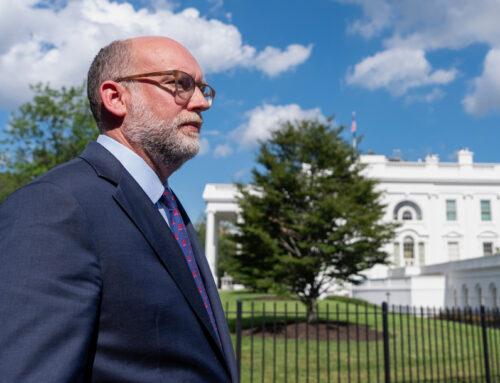Youth-led US climate activists widen focus to fight authoritarianism
October 5, 2025
As the Trump administration cracks down on both environmental policies and progressive activism, the Sunrise Movement, the youth-led climate justice organization that popularized calls for a Green New Deal, is widening its mission to fight authoritarianism.
“Every day, Donald Trump is seizing power and shredding the Constitution,” Sunrise’s executive director, Aru Shiney-Ajay, wrote in an open letter to Sunrise members, funders and allies. “What ordinary people do in the coming months will determine whether he and his billionaire cronies can cement their grip on power and turn this country into a playground for the rich and powerful.”
Unlike the majority of Sunrise’s past work, its newer efforts will not necessarily center the climate crisis. But Stevie O’Hanlon, a co-founder and spokesperson for Sunrise, said the projects will aim to build a world where climate action is possible.
“In order to win the bold action that we’ll need to prevent climate catastrophe, we’re going to need a country where we have the right to dissent and protest,” she said. “How are we going to win on climate under authoritarianism?”
One key focus will be campus organizing to urge schools to resist Trump’s attempts to control their curricula and rules around political dissent, the letter from Shiney-Ajay says. Another will be garnering rapid responses to the administration’s deployment of troops and immigration policies to cities, and attempts to “infringe on our first amendment rights”. And a third expansion area will be training young activists to “recognize authoritarianism” and resist it using non-violent tactics.
The missive formalizes work already underway at Sunrise. Last month, the group helped organize student walkouts at four Washington DC universities to protest Trump’s deployment of the national guard and their intimidation of activists and immigrants. Two weeks later, the organization staged a comedy show-cum-demonstration outside ABC’s New York headquarters in response to the network’s temporary suspension of Jimmy Kimmel Live!.
Chapters have been taking on localized fights for free speech and immigrant rights, as well. At Duke University’s Sunrise chapter, activists have focused on protecting a beloved campus bus driver whose temporary protected status was revoked by the Trump administration last month – and who subsequently lost his job of 20 years. They are also urging school officials to overturn anti-protest policies and developing pro-worker campaigns alongside labor justice groups.
“In order to win a Green New Deal, climate justice, labor justice, racial justice, etc … we’re gonna need to defeat authoritarianism,” said Artivista Karlin, a junior at Duke University who organizes with the campus Sunrise chapter, who said that under Trump, the US has seen an “unprecedented manifestation of fascism”.
Future Sunrise Movement efforts could include nationwide efforts to stop Immigration and Customs Enforcement (Ice) raids, campaigns to back city officials standing up to Trump, and actions to resist Republicans’ cuts to healthcare programs. The organization will also build toward a mass student mobilization on 1 May 2028, when United Auto Workers president Shawn Fain has called for a general strike.
The refocus comes seven years after Sunrise captured national headlines when its members stormed the office of then incoming House speaker Nancy Pelosi. Joined by then freshman New York representative Alexandria Ocasio-Cortez, the group demanded the rapid phase-out of fossil fuels, the creation of good jobs, and the strengthening of social programs across the US. The policy platform, which they called the Green New Deal, helped inspire some of Joe Biden’s green policies, most notably the Inflation Reduction Act.
O’Hanlon sees the new tactics as an outgrowth of the fight for a Green New Deal, which highlighted how climate is intertwined with all other major social issues.
“The Green New Deal is critical for laying out an alternative world from the one that Donald Trump is portraying,” she said. “We’re going to keep talking about that, keep fighting for that vision, but in the short term, we need to also be confronting, their assault on our communities and on our rights.”
The shift also comes as climate concerns slip slightly down the list of electoral concerns in favor of economic issues, though evidence shows most people still want to draw down emissions.
“My guess is you’re not going to see a lot of politicians using the word ‘climate,’ because people see that as a nice-to-have [concern], not a must-have, and right now they’re in the must-have mode,” Biden’s energy secretary, Jennifer Granholm, told reporters in New York last month.
Democratic presidential hopeful Kamala Harris last year came under fire for messaging around the threat Trump poses to democracy, rather than economic concerns, with some blaming the shift for her loss of the 2024 election. But O’Hanlon says concerns about authoritarianism feel more potent to Americans amid current attacks from the administration, and that Sunrise’s new campaigns will be far more concrete than Harris’s.
“A lot of the messaging on the Harris campaign was focused on this abstract idea of democracy, of saving democracy, but I think most people in this country feel like democracy is pretty broken,” she said. “When you’re talking about saving democracy, then people understand that as saving a broken political system that very, very few people think is working, and Donald Trump was able to position himself as the person who is going to disrupt and change the broken system.”
Sunrise, by contrast, will focus on the need for major changes, including the removal of corporate interests such as the fossil fuel industry from politics.
“We’re being very clear that yes, we need to defend rights to free speech, [but] we also need to be serious about overhauling our democracy so that we are not in a situation where someone like Donald Trump can consolidate power in this kind of way ever again,” O’Hanlon said.
The expansion comes amid an all-out assault from the White House on both green protections and progressive organizing. Since January, the president has rolled back hundreds of environmental rules demolished Biden-era incentives for carbon-free technologies. In recent weeks he also designated the decentralized antifascist movement, antifa, a “terrorist organization”, and issued a memorandum aimed at reining in what he calls the radical leftwing domestic “terror network”.
Last week, Trump said George Soros, the billionaire philanthropist who funds the Open Society Foundations (OSF), is “a likely candidate” for prosecution for unspecified charges. Sunrise obtained $2.1m from the foundations between 2019 and 2023, OSF’s website shows.
“We will raise our voices against this authoritarian abuse of power,” Shiney-Ajay said.
Trump this week also posted Trump 2028 hats on social media, indicating interest in a potential, unconstitutional third term.
“We are just seeing outright disrespect for our constitutional rights, and we can’t accept that,” said O’Hanlon.
Search
RECENT PRESS RELEASES
Related Post




